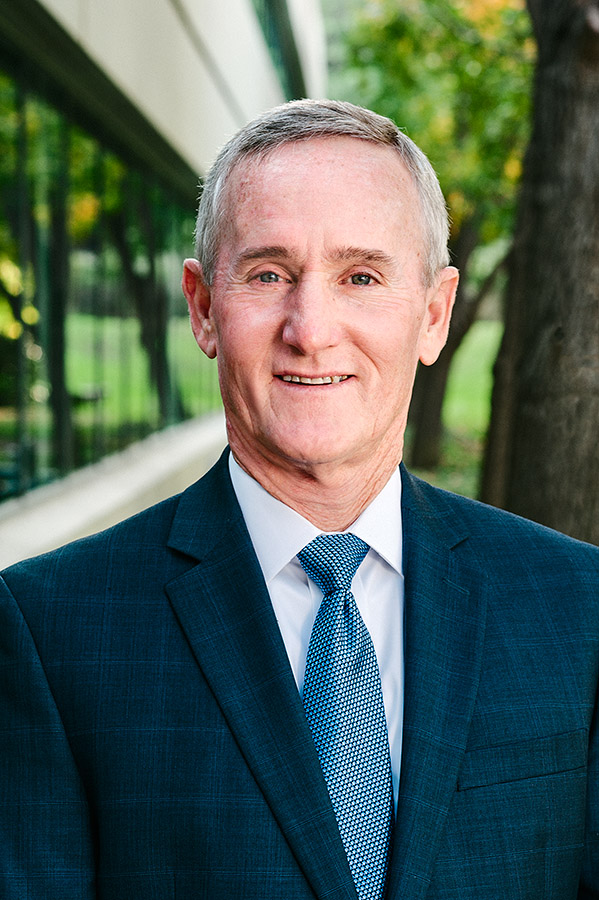
Russell A. Colombo is President and Chief Executive Officer of Bank of Marin Bancorp. He is a lifelong resident of Marin County in the San Francisco Bay Area. He received a Bachelor of Science degree in agricultural economics and business management from the University of California, Davis and his Master of Business Administration in banking and finance from Golden Gate University.
Mr. Colombo joined Bank of Marin in 2004 as Executive Vice President and Branch Administrator after 29 years in banking at Comerica Bank, Security Pacific and Union Bank in San Francisco.
He was appointed Executive Vice President and Chief Operating Officer of Bank of Marin in 2005 and assumed the position of President and Chief Executive Officer in 2006.
In his current role, he leads the premier community and business bank in the Bay Area, with 22 branches, five commercial banking offices and one loan production office located across Marin, Sonoma, Napa, San Francisco, Contra Costa and Alameda counties.
Mr. Colombo is a board member of the California Bankers Association, Past Chairman of Western Independent Bankers Association and is a member of its executive committee and Chairman of the Citizens Oversight Committee of SMART — Sonoma Marin Area Rail Transit.
In this 1,474 word interview, exclusively in the Wall Street Transcript, Mr. Colombo details his COVID 19 crisis management.
“Small-business owners with up to $50 million in revenue. That’s our primary customer, and we do a lot of lending to real estate investors. With the small-business owners, we finance the business, and we likely would finance the building where they operate as well.
We also do a lot of commercial real estate where we are providing loans to investors to purchase commercial real estate. That’s a mixed bag in this pandemic environment, depending on what type of commercial real estate you’re financing.
We don’t have a lot of hospitality; we have a few hotels, and frankly, all of them are empty right now.
But in most cases, we have guarantors with liquidity.
Wine business is suffering certainly because people aren’t visiting wineries, but they are selling a lot of wine wholesale, in the grocery stores.
Overall, the loan portfolio is in solid shape, and while we are bound to see additional challenges, we expect to weather this storm just as we have past downturns.”
Mr. Colombo goes into more detail:
“Like everybody else, I’m worried about how quickly the economy can come back once we get through this crisis. And that’s going to impact everybody.
I think this will have a significant impact on commercial real estate values. We’re looking at our portfolio very carefully to see where there are potential issues in valuation.
I will say this, values have accelerated in the Bay Area, primarily driven by technology. We have been careful about not advancing into very high valuations, which we think are a little bit too high.
We have scaled back what were our advanced rates to adjust for that, because as I looked at our real estate portfolio, it’s in really good shape, and I’m confident we’ll get through this issue.
Like all banks, we put in programs for companies and real estate that we financed to go to interest-only or even for payment deferrals, and we’ve had approximately 17% of our portfolio do that, but none of which am I really tremendously worried about.
There’s no question the hospitality area is going to be the big challenge coming out of this. We don’t deal with a lot of restaurants today. We do have some hotels, not a huge number, but a few, and those are going to be challenging.
Now, the good news is, on most of them we either have low loan-to-value ratios or very strong guarantors, or in many cases both.
Overall, I will say, I’m optimistic, and the bank is in very good shape.”
Read the entire 1,474 word interview with Mr. Colombo to get the complete detail, exclusively in the Wall Street Transcript.
The Credit Crisis and Education
April 14, 2008
Insight from the Center of the Mortgage Crisis
November 20, 2008
Recommended Reading – SEC to Examine Boards’ Role in Financial Crisis, Washington Post
February 20, 2009
What were they thinking? The Financial Crisis in the Banking Sector.
May 21, 2009
Best Performing Sectors Contingent on European Debt Crisis
October 20, 2011